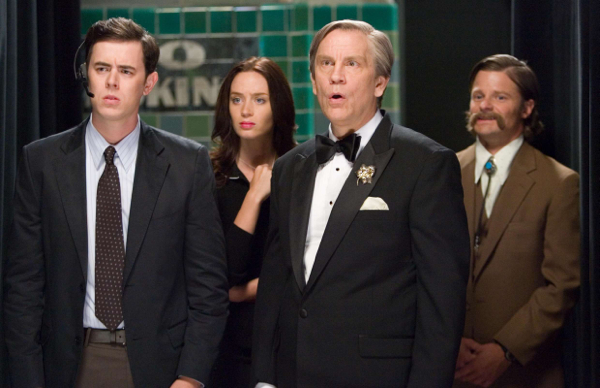Movie review by Greg Carlson
A passable, nostalgia-fueled coming-of-age yarn about the relationship between an Amazing Kreskin-esque “mentalist” and his youthful road manager/assistant, “The Great Buck Howard” will interest followers of John Malkovich anxious to see anything featuring the quirky performer. Inspired in part by the real life experiences of writer-director Sean McGinly, who was at one time employed by Kreskin, “The Great Buck Howard” settles immediately for a congenial, relaxed tone that suggests very little, beyond a bruised ego, will be at stake as the story unfolds. Starring alongside Malkovich is Colin Hanks, whose pleasant, even-tempered demeanor is in desperate need of some sort of darker edge.
Hanks plays law school dropout Troy Gable, an aspiring writer – of what exactly, we never really come to know – who accepts a position with fading stage performer and titular supersensible Howard (Malkovich, smoothly negotiating the quick tempered, easily offended narcissist that he has essentially perfected). Troy’s serenity and relatively thick skin aid him as he defuses Howard’s tantrums and soothes his injured pride. Despite appearing on “The Tonight Show with Johnny Carson” sixty-one times, Howard hasn’t been much of a celebrity for years, and his act takes him to half-filled theatres in all kinds of lackluster burgs.
The psychological tension of superior/subordinate professional relationships that inevitably turn personal has been more effectively observed in films like “The Servant,” “The Dresser,” “The Devil Wears Prada” and countless others. Instead of exploring any possibility that Troy might become frustrated with Howard’s fussiness and react accordingly, “The Great Buck Howard” opts instead for a misty-eyed overdose of sentimentality, abetted by an unnecessary voiceover in which Troy repeatedly points out the obvious. To be fair, McGinly makes clear his intention to write Troy in such a way that the young man unfailingly sees the good in Howard, even though the act itself is dusty, corny, and repetitious.
McGinly introduces a spark of tension with the arrival of publicist Valerie Brennan (Emily Blunt), apparently the only person in Howard’s orbit unwilling to sugarcoat the sad reality of his declining status. Valerie and Troy fall quickly for one another, but once again, the only dramatic mileage to be gained from their liaison appears in an expression of realization and resentment that plays across Howard’s face while he prepares a comeback effect that includes what looks like a pretty run-of-the-mill mass hypnosis staged in Cincinnati. Naturally, the big event fails to turn out the way Howard dreamed it would.
Celebrities from Gary Coleman to John Stewart pop up in “The Great Buck Howard,” and the number of familiar faces lends a feeling of backstage show business life to the fictional biography enacted by Malkovich. Most of the famous appear as themselves, but Colin’s real life dad Tom Hanks, one of the movie’s producers, drops by for two scenes as Troy’s disapproving father. “The Great Buck Howard” is too fond of its title character to sink a set of satirical fangs into the carefully constructed self-importance Howard wears like a cape. Had the film treated the audience to the mechanics of that particular illusion, McGinly might have conjured something really worth seeing.
